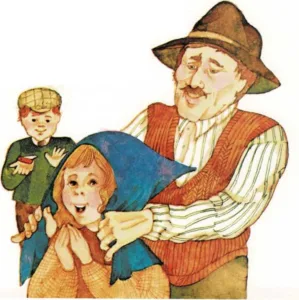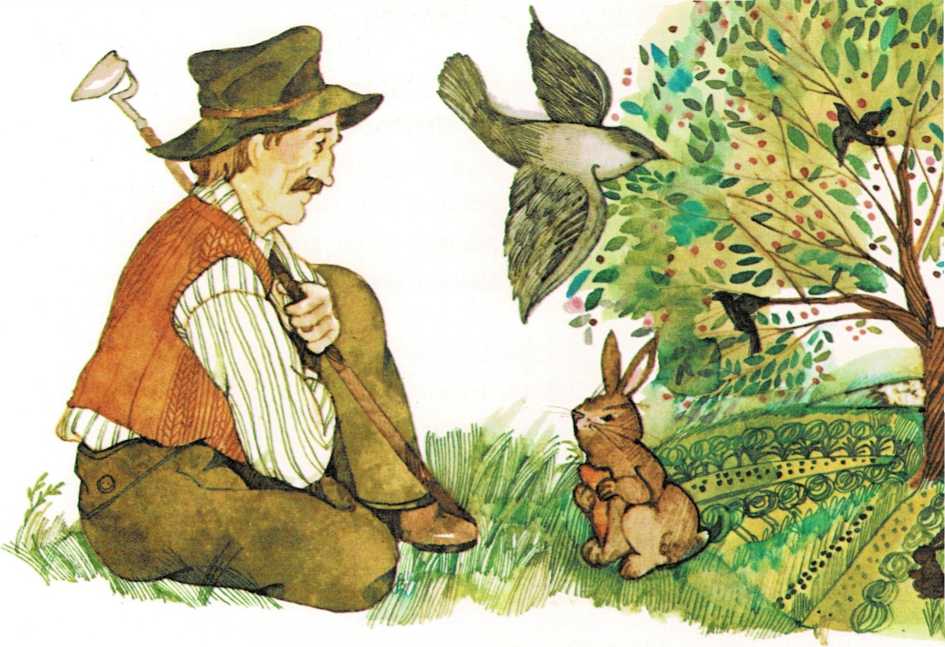
The Peddler of Ballaghaderreen by Ruth Sawyer
Ruth Sawyer, author and storyteller, collected many folktales in
Ireland. Here is a story she heard from John Hegarty, who was a Donegal
shanachie, or travelling storyteller. Ballaghaderreen, which means \”the
road of the little oak wood,” is a town in County Roscommon, Ireland.
More years ago than you can tell me and twice as many as I can tell you,
there lived a peddler in Ballaghaderreen. He lived at the crossroads, by
himself in a bit of a cabin with one room to it, and that so small that
a man could stand in the middle of the floor and, without taking a step,
he could lift the latch on the front door, he could lift the latch on
the back door, and he could hang the kettle over the turf. That is how
small and snug it was.
Outside the cabin the peddler had a bit of a garden. In it he planted
carrots and cabbages,
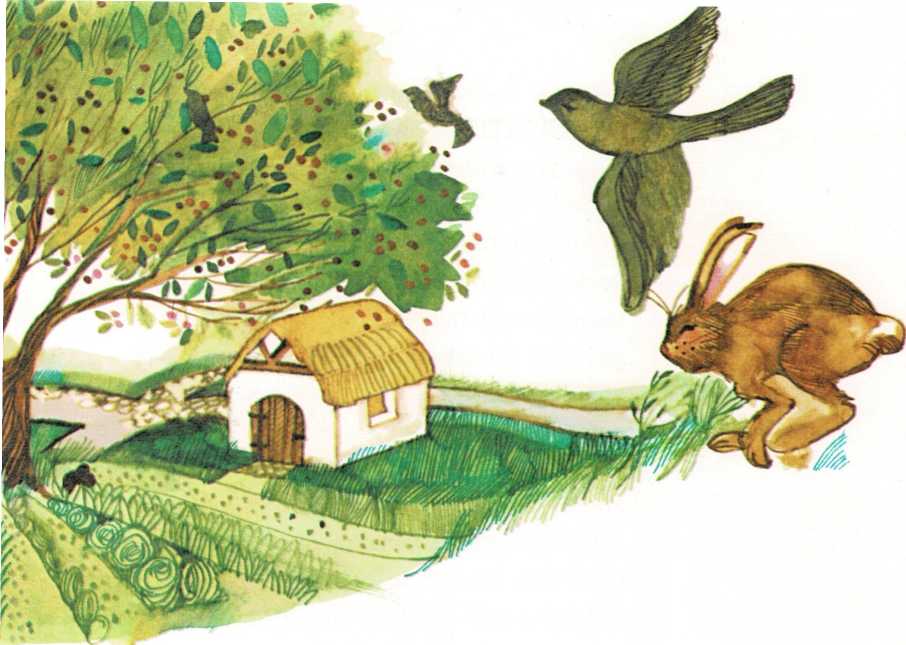
onions and potatoes. In the center grew a cherry tree—as brave and
fine a tree as you would find anywhere in Ireland. Every spring it
flowered, the white blossoms covering it like a fresh falling of snow.
Every summer it bore cherries as red as heart’s blood.
But every year, after the garden was planted the wee brown hares would
come from the copse nearby and nibble-nibble here, and nibble-nibble
there, until there was not a thing left, barely, to grow into a
full-sized vegetable that a man could harvest for his table. And every
summer as the cherries began to ripen the blackbirds came in whirling
flocks and ate the cherries as fast as they ripened.
The neighbors that lived thereabouts minded this and nodded their heads
and said:
\”Master Peddler, you’re a poor, simple man, entirely. You let the wild
creatures thieve from you without lifting your hand to stop them.”
And the peddler would always nod his head back at them and laugh and
answer: \”Nay, then, ’tis not thieving they are at all. They pay well
for what they take. Look you—on yonder cherry tree the blackbirds sing
sweeter nor they sing on any cherry tree in Ballaghaderreen. And the
brown hares make good company at dusk-hour for a lonely man.”
In the country roundabout, every day when there was market, a wedding,
or a fair, the peddler would be off at ring-o’-day, his pack strapped on
his back, one foot ahead of the other, fetching him along the road. And
when he reached the town diamond he would open his pack, spread it on
the green turf, and, making a hollow of his two hands, he would call:
\”Come buy a trinket—come buy a brooch—
Come buy a kerchief of scarlet or yellow!”
In no time at all there would be a great crowding of lads and lasses and
children about him, searching his pack for what they might be wanting.
And like as not, some barefooted lad would hold up a jackknife and ask:
\”How much for this, Master Peddler?”
And the peddler would answer: \”Half a crown.”
And the lad would put it back, shaking his
head dolefully. \”Faith, I haven’t the half of that, nor likely ever to
have it.”
And the peddler would pull the lad over to him and whisper in his ear:
\”Take the knife—’twill rest a deal more easy in your pocket than in
my pack.”
Then, like as not, some lass would hold up a blue kerchief to her yellow
curls and ask: \”Master Peddler, what is the price of this?”
And the peddler would answer: \”One shilling sixpence.”
And the lass would put it back, the smile gone from her face, and she
turning away.
And the peddler would catch up the kerchief again and tie it himself
about her curls and laugh and say: \”Faith, there it looks far prettier
than ever it looks in my pack. Take it, with God’s blessing.”
So it would go—a brooch to this one and a top to that. There were days
when the peddler
took in little more than a few farthings. But after those days he would
sing his way homeward; and the shrewd ones would watch him passing by
and wag their fingers at him and say: \”You’re a poor, simple man,
Master Peddler. You’ll never be putting a penny by for your old age.
You’ll end your days like the blackbirds, whistling for crumbs at our
back doors. Why, even the vagabond dogs know they can wheedle the half
of the bread you are carrying in your pouch, you’re that simple.”
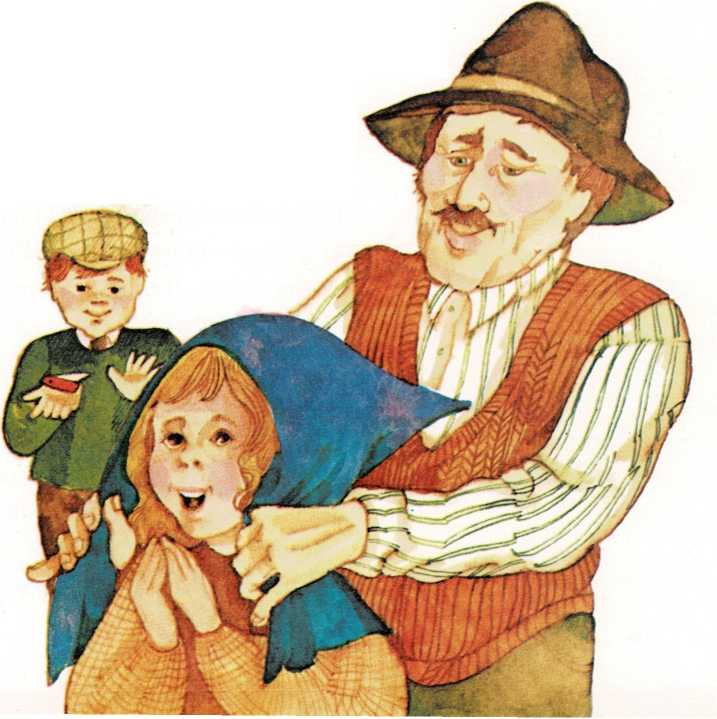
Which likewise was true. Every stray, hungry dog knew him the length and
breadth of the county. Rarely did he follow a road without one tagging
his heels, sure of a noonday sharing of bread and cheese.
There were days when he went abroad without his pack, when there was no
market day, no wedding or fair. These he spent with the children, who
would have followed him about like the dogs, had their mothers let them.
On these days he would sit himself down on some doorstep and when a
crowd of children had gathered he would tell them tales—old tales of
Ireland—tales of the good folk, of the heroes, of the saints. He knew
them all, and he knew how to tell them, the way the children would never
be forgetting one of them, but carry them in their hearts until they
were old.
And whenever he finished a tale he would say, like as not, laughing and
pinching the cheek of some wee lass: \”Mind well your manners, whether
you are at home or abroad, for you can never be telling what good folk,
or saint,
or hero you may be fetching up with on the road—or who may come
knocking at your doors. Aye, when Duirmuid, or Fionn or Oisin or Saint
Patrick walked the earth they were poor and simple and plain men; it
took death to put a grand memory on them. And the poor and the simple
and the old today may be heroes tomorrow—you never can be telling. So
keep a kind word for all, and a gentling hand.”
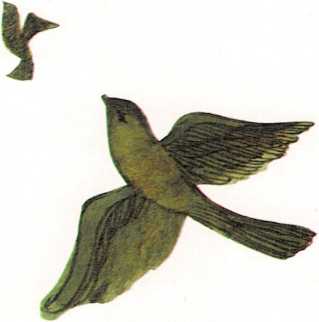
Often an older would stop to listen to the scraps of words he was
saying; and often as not he would go his way, wagging his finger and
mumbling: “The poor, simple man. He’s as foolish as the blackbirds.”
Spring followed winter in Ireland, and summer followed close upon the
heels of both. And winter came again and the peddler grew old. His pack
grew lighter and lighter, until the neighbors could hear the trinkets
jangling inside as he passed, so few things were left. They would nod
their heads and say to one another: “Like as not his pockets are as
empty as his pack. Time will come, with winter at hand, when he will be
at our back doors begging crumbs, along with the blackbirds.”
The time did come, as the neighbors had prophesied it would, smug and
proper, when the peddler’s pack was empty, when he had naught in his
pockets and naught in his cupboard. That night he went hungry to bed.
Now it is more than likely that hungry men will dream; and the peddler
of Ballaghaderreen had a strange dream that night. He dreamed that there
came a sound of knocking in the
middle of the night. Then the latch on the front door lifted, the door
opened without a creak or a cringe, and inside the cabin stepped Saint
Patrick. Standing in the doorway the good man pointed a finger; and he
spoke in a voice tuned as low as the wind over the bogs. \”Peddler,
peddler of Ballaghaderreen, take the road to Dublin Town. When you get
to the bridge that spans the Liffey you will hear what you were meant to
hear.”
On the morrow the peddler awoke and remembered the dream. He rubbed his
stomach and found it mortal empty; he stood on his legs and found them
trembling in under him; and he said to himself: \”Faith, an empty
stomach and weak legs are the worst traveling companions a man can have,
and Dublin is a long way. Fil bide where I am.”
That night the peddler went hungrier to bed, and again came the dream.
There came the
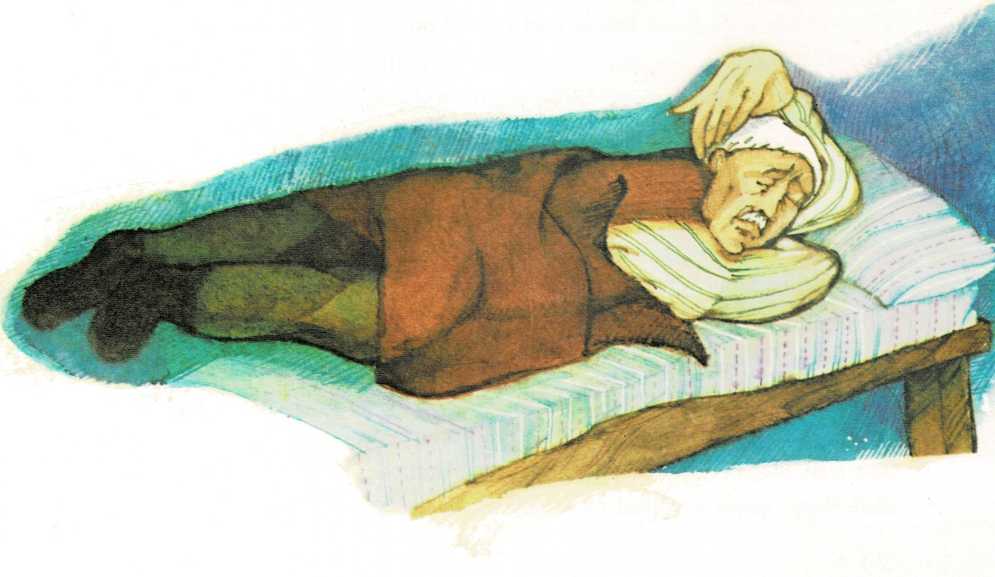
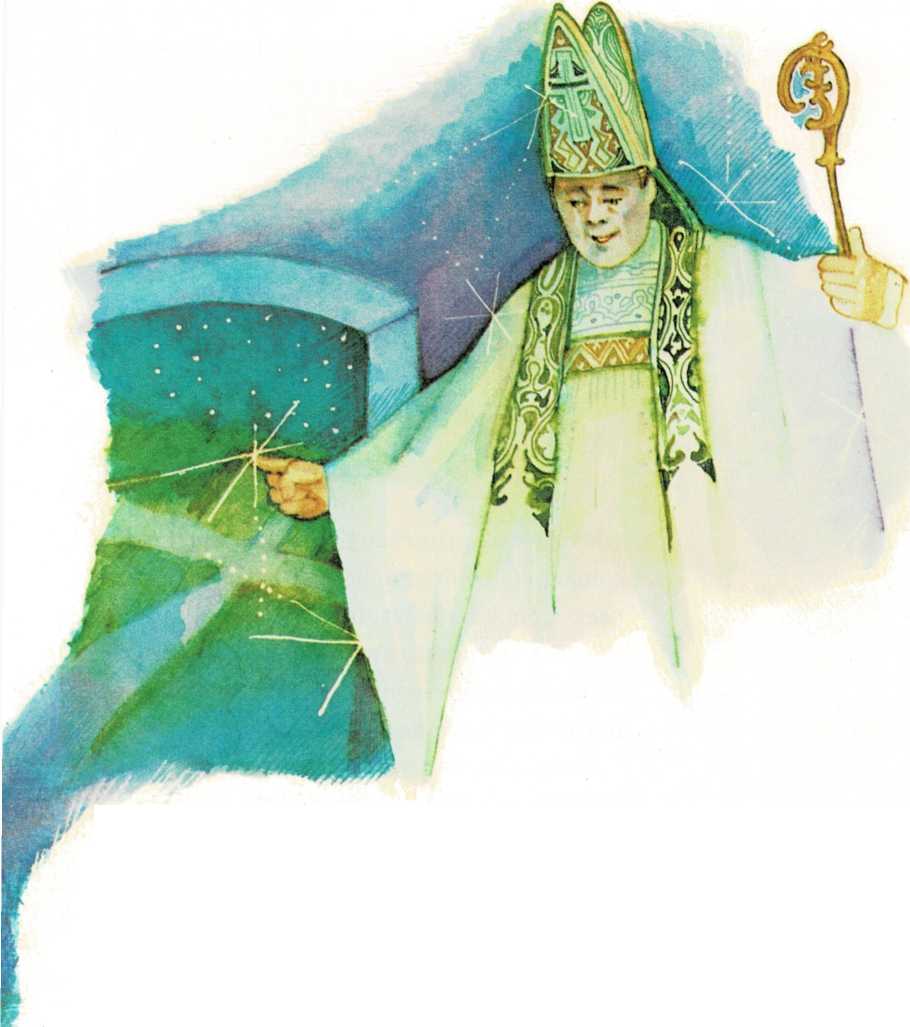
knocking on the door, the lifting of the latch. The door opened and
Saint Patrick stood there, pointing the road: \”Peddler, peddler of
Ballaghaderreen, take the road that leads to Dublin Town. When you get
to the bridge that spans the Liffey you will hear what you were meant to
hear!”
The second day it was the same as the first. The peddler felt the hunger
and the weakness stronger in him, and stayed where he was. But

when he woke after the third night and the third coming of the dream, he
rose and strapped his pack from long habit upon his back and took the
road to Dublin. For three long weary days he traveled, barely staying
his fast, and on the fourth day he came into the city.
Early in the day he found the bridge spanning the river and all the
lee-long day he stood there, changing his weight from one foot to the
other, shifting his pack to ease the drag of it, scanning the faces of
all who passed by. But although a great tide of people swept this way,
and a great tide swept that, no one stopped and spoke to him.
At the end of the day he said to himself: \”I’ll find me a blind alley,
and like an old dog I’ll lay me down in it and die.” Slowly he moved off
the bridge. As he passed by the Head Inn of Dublin, the door opened and
out came the landlord.
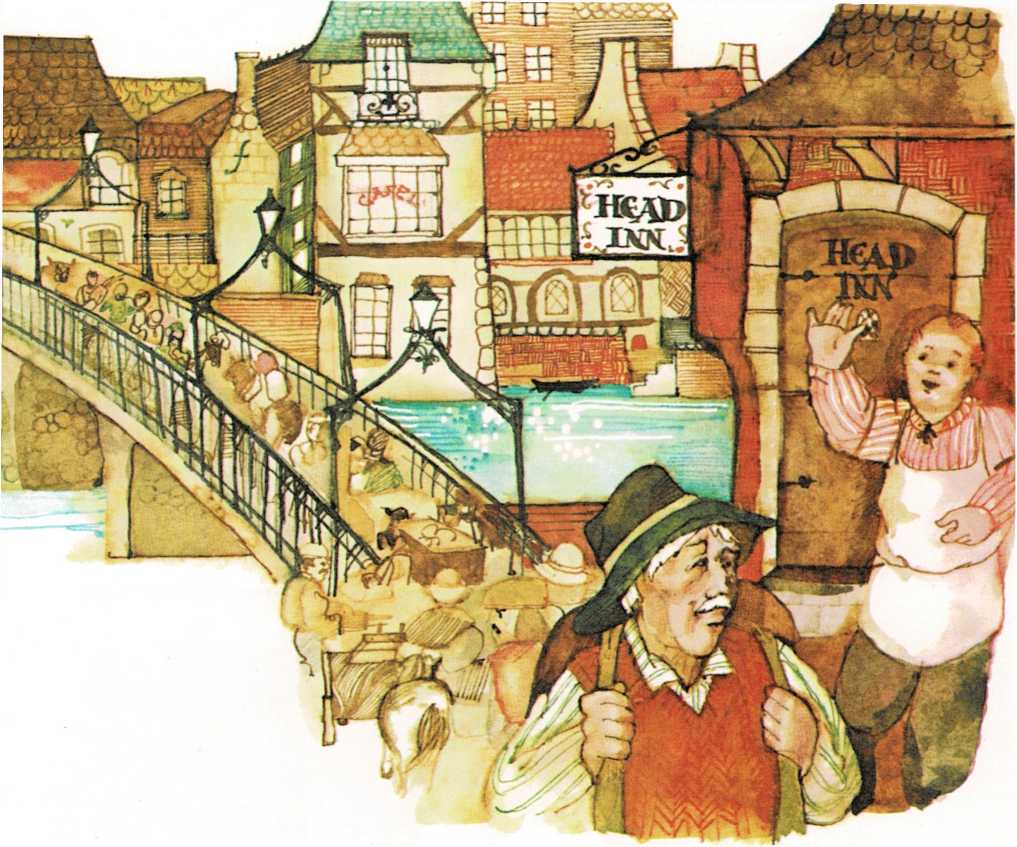
To the peddler’s astonishment he crossed the thoroughfare and hurried
after him. He clapped a strong hand on his shoulder and cried: \”Arra,
man hold a minute! All day I’ve been watching you. All day I have seen
you standing on the bridge like an old rook with rent wings. And of all
the people passing from the west to the east, and of all the people
passing from the east to the west, not one crossing the bridge spoke
aught with you. Now I am filled with a great curiosity entirely to know
what fetched you here.”
Seeing hunger and weariness on the peddler, he drew him toward the inn.
\”Come; in return for having my curiosity satisfied you shall have rest
in the kitchen yonder, with bread and cheese and ale. Come.”
So the peddler rested his bones by the kitchen hearth and he ate as he
hadn\’t eaten in many days. He was satisfied at long last and the
landlord repeated his question. \”Peddler, what fetched you here?”
\”For three nights running I had a dream—” began the peddler, but he
got no further.
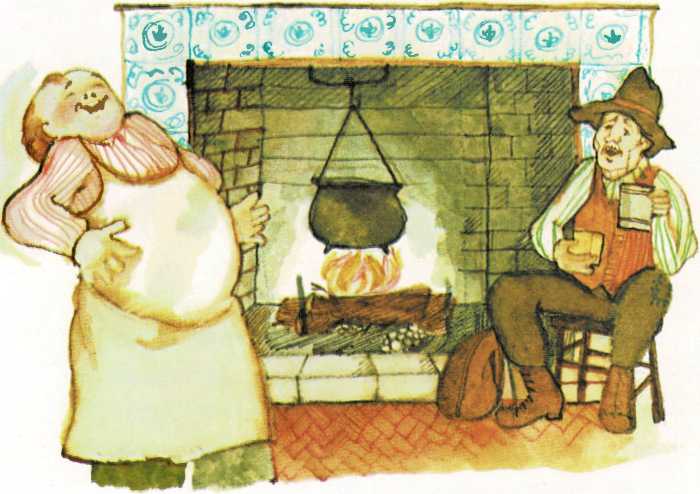
The landlord of the Head Inn threw back his head and laughed. How he
laughed, rocking on his feet, shaking the whole length of him!
\”A dream you had, by my soul, a dream!” He spoke when he could get his
breath. \”I could be telling you were the cut of a man to have
dreams, and to listen to them, what’s more. Rags on your back and hunger
in your cheeks and age upon you, and I’ll wager not a farthing in your
pouch. Well, God’s blessing on you and your dreams.”
The peddler got to his feet, saddled his pack, and made for the door. He
had one foot over the sill when the landlord hurried after him and again
clapped a hand on his shoulder.
\”Hold, Master Peddler,” he said, \”I too had a dream, three nights
running.” He burst into laughter again, remembering it. \”I dreamed
there came a knocking on this very door, and the latch lifted, and,
standing in the doorway, as you are standing, I saw Saint Patrick. He
pointed with one finger to the road running westward and he said:
\’Landlord, Landlord of the Head Inn, take that road to
Ballaghaderreen. When you come to the crossroads you will find a wee
cabin, and beside the cabin a wee garden, and in the center of the
garden a cherry tree. Dig deep under the tree and you will find
gold—much gold.’ “
The landlord paused and drew his sleeve across his mouth to hush his
laughter.
\”Ballaghaderreen! I never heard of the place. Gold under a cherry
tree—whoever heard of gold under a cherry tree! There is only one
dream that I hear, waking or sleeping, and it’s the dream of gold, much
gold, in my own pocket. Aye, listen, ’tis a good dream.” And the
landlord thrust a hand into his pouch and jangled the coins loudly in
the peddler’s ear.

Back to Ballaghaderreen went the peddler, one foot ahead of the other.
How he got there I cannot be telling you. He unslung his pack, took up a
mattock lying nearby, and dug under the cherry tree. He dug deep and
felt at last the scraping of the mattock against something hard and
smooth. It took him time to uncover it and he found it to be an old sea
chest, of foreign pattern and workmanship, bound around with bands of
brass. These he broke, and lifting the lid he found the chest full of
gold, tarnished
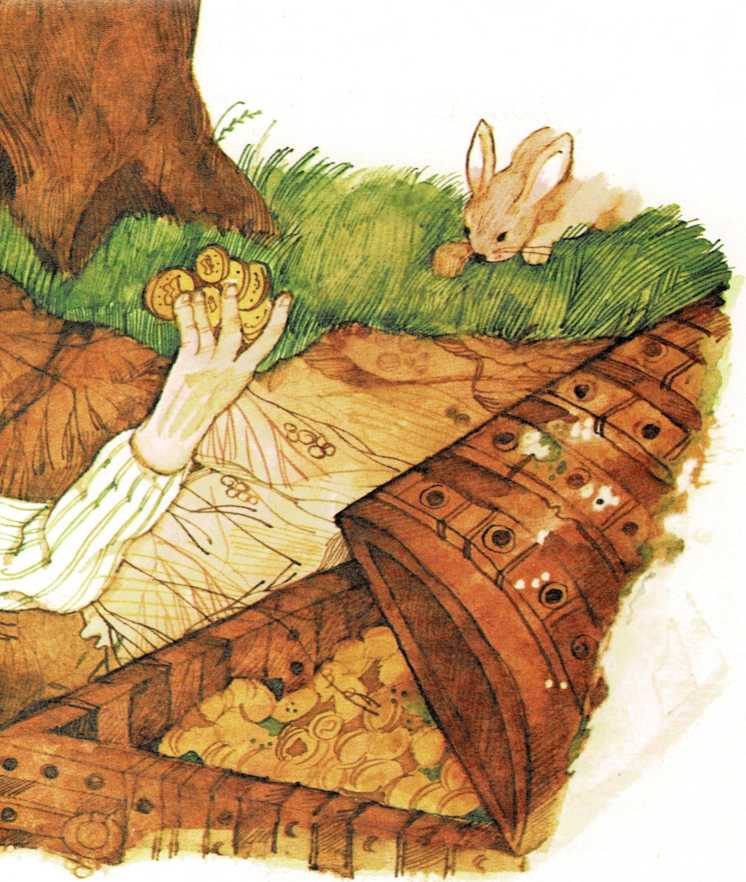
and clotted with mold; pieces of six and pieces of eight and Spanish
doubloons.
I cannot begin to tell the half of the goodness that the peddler put
into the spending of that gold. But this I know. He built a chapel at
the crossroads—a resting place for all weary travelers journeying
thither.
And after he had gone the neighbors had a statue made of him and placed
it facing the crossroads. And there he stands to this day, a pack on his
back and a dog at his heels.

